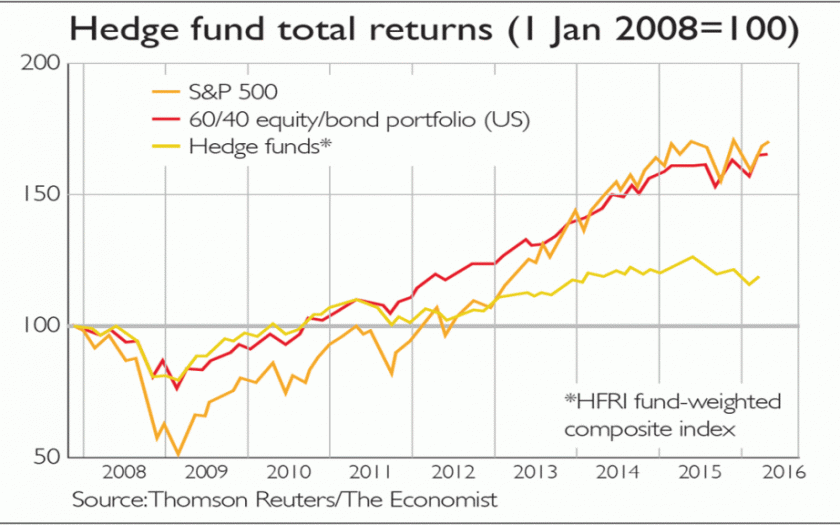
“Hedge funds employ the cleverest people in the world to exploit the opportunities that other managers miss,” says the Buttonwood columnist in The Economist. “That is why they deserve their high fees – or so the story goes. That story is getting harder and harder to believe.”
In the first quarter of 2016, the average hedge fund lost 0.8% after fees, according to index provider Hedge Fund Research (HFR). That’s after losing 1.1% in 2015 and gaining 3% in 2014. The average investor has earned just 1% since the beginning of 2014, while the S&P 500 has gone up by 12% over the same period.
What’s happened? The hedge-fund industry has become a “victim of its own popularity”, say David Randall, Svea Herbst-Bayliss and Lawrence Delevingne on Reuters.com. There are now more than 10,000 global hedge funds and funds of hedge funds, all trying to make money in a world of low rates and limited opportunities, with predictable results.
“Many managers are chasing the same ideas… lowering potential returns.”Hence the first quarter of 2016 has been “one of the most catastrophic periods of hedge-fund performance that we can remember,” says Daniel Loeb, manager of the $17.5bn Third Point hedge fund in a recent letter to investors.
This was due both to market swings driven by news on the Chinese economy, and to ill-fated bets on many stocks where hedge funds have had big positions, such as Facebook, Netflix, Valeant and Allergan. This run of poor returns comes at a time when “institutions such as pension funds are questioning the value of investing in hedge funds”, say Mary Childs and Stephen Foley in the Financial Times. Some are already heading for the exit: investors withdrew $15.1bn from hedge funds in the first quarter of 2016, according to HFR. If returns don’t improve, outflows will continue.
Rightly so, given that the long-term case for hedge funds looks decidedlyshaky, notes Buttonwood. Back in 2008, Warren Buffett bet hedge-fund manager Ted Seides $1m that a Vanguard S&P index fund would beat a portfolio of hedge funds over ten years. The S&P 500 is currently up 65.7% since 2008 (see chart). A simple 60/40 stock/bond portfolio has had similar returns with less volatility.
The average hedge fund is up by just 21.9% (see chart). Unless something drastic happens in the next 19 months, Buffett “seems almost certain to collect”, says Buttonwood. Regrettably, hedge-fund investors won’t do so well.